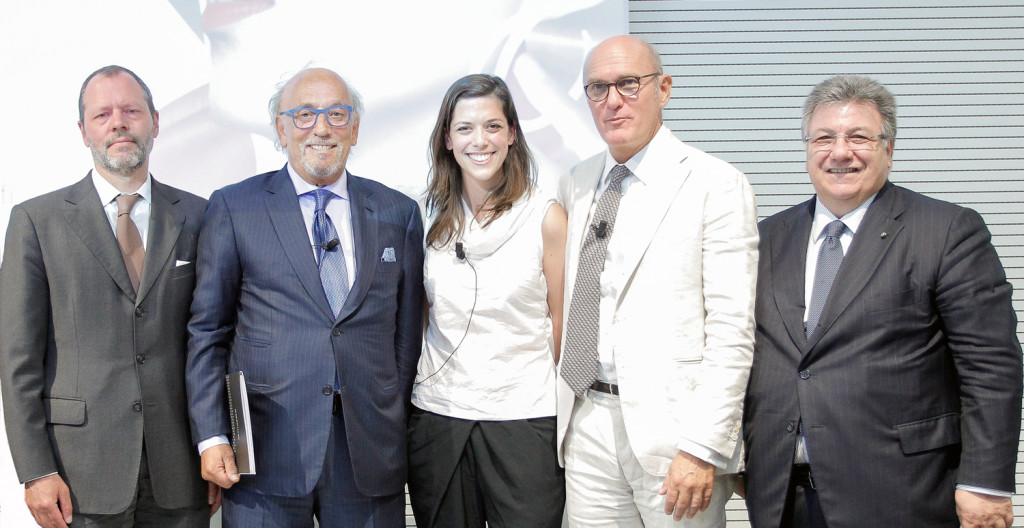CIBJO releases Diamond Commission Special Report,
looks at varied impacts of technology on industry and trade

SEPTEMBER 7, 2016
With seven weeks to go to the opening of the 2016 CIBJO Congress in Yerevan, Armenia, on October 26, 2016, the third of the CIBJO commissions’ Special Reports has been released. Prepared by the CIBJO Diamond Commission, headed by Udi Sheintal, the report reviews the impacts of technology, both positive and negative, on the jewellery industry and trade, and investigates ways in which the business should react.
The report studies two developments in particular. The first is synthetic diamonds. In this respect it reiterates standards introduced by CIBJO to clearly distinguish between natural and man-made gems. In 2015 these essentially were adopted by the International Standards Organisation, when it released ISO International Standard 18323, which specifies a set of permitted descriptors for the diamond industry that are designed to be understood by the consumer. The report then outlines a number of variables, including investment in generic marketing campaigns, which ultimately will decide the degree to which the introduction of gem-quality synthetics into the market will affect the price of naturally mined stones.
The second development concerns scanning technologies that have been created in recent years that enable rough dealers to accurately map the internal inclusions in a stone. Specifically, the report investigates the ethical implications of such technologies, and considers whether rough dealers who have scanned their stones are obliged to inform clients that they have done so, and even possibly divulge the results.
“Technology has become an integral component in our business, and just as we need to adapt to the changes that it has instigated, the developers of technology should be cognisant that their products serve the greater good of the industry from which they benefit,” writes Diamond Commission President Udi Sheintal in the report. “In this respect it is important that constant dialogue take place between the industry and the technology developers with the understanding that, ultimately, our long-term interests are the same, and that is we should have a healthy and profitable diamond and jewellery business.”
To download a full copy of the report, PLEASE CLICK HERE.

Seminar presenters (from left): Jean-Marc Lieberherr, CEO of the Diamond Producers Association, which is about to introduce the industry’s first sustained generic marketing campaign in 10 years, which will mainly be directed at Millennials; Roberto Coin, the leading Italian jewellery designer and brand developer; Ella Goldner, Global Strategy Director at IPG Mediabrands in London; Costantino Papadimitriou, head of global communication strategy and campaigns, and brand innovation at De Beers’ Forevermark; and CIBJO President Gaetano Cavalieri.
At VicenzaOro September, CIBJO and Fiera di Vicenza convened what almost certainly was one the most expert panels ever gathered to consider the topic. It included:
- Ella Goldner, a Global Strategy Director at IPG Mediabrands in London, which is part of an advertising and marketing network that includes McCann World Group, Lowe and Partners and FCB. She specializes in marketing to Millennials, developing campaigns that meet their requirements, and delivering and reinforcing their content using new media tools.
- Jean-Marc Lieberherr, the CEO of the Diamond Producers Association, which has taken upon itself the task of reintroducing category or generic marketing for the diamond jewellery sector. He earlier served as Managing Director of Rio Tinto Diamonds, and before joining the diamond industry worked in international sales and marketing positions with LVMH and Unilever.
- Costantino Papadimitriou, who is responsible for global communication strategy and campaigns, as well as brand innovation, at De Beers’ Forevermark, which is far and away has the largest advertising budget in the diamond jewellery sector. He leads Forevermark’s London-based communication team as well as its Milan based Design and Innovation Centre. Previously he worked for J. Walter Thompson for 27 years.
- Roberto Coin, President, owner and visionary of the Roberto Coin Group and brand, which is sold in more than 1,000 outlets in 62 countries. Acutely aware of the growing sentiment among consumers for issues related to CSR and sustainability, in 2013 he was awarded an Andrea Palladio International Jewellery Award for Best Corporate Social Responsibility Brand.
The moderator of the seminar was Steven Benson, CIBJO’s Director of Communications.
CIBJO has made available for downloading the presentations delivered at the seminar, via a dedicated page on VOICES OF CIBJO section of the website. To access the page, CLICK HERE.
